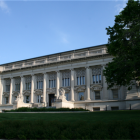
Massachusetts Leans toward Juvenile Hall for 17-year-olds
|
Massachusetts looks likely to raise the age of criminal jurisdiction to 18 next year, and may make more changes as nearly simultaneous new rules from the federal government, a U.S. Supreme Court decision and a report from the state’s Child Advocate nudge Boston lawmakers toward more reforms.
“I think there’s a lot of support” to raise the age, said state Rep. Kay Khan (D-Newton), chair of the Joint Committee on Children, Families and Persons with Disabilities, as well as House sponsor of an age-raising bill that passed House and Senate committees this year. Right now, Massachusetts reserves juvenile proceedings for those under 17. Khan’s House Bill 450 simply replaced the word “seventeen” with “eighteen.”
“I’ll be working on that pretty steadily and heavily. It just doesn’t make any sense not to do that,” said Khan. That work comes as the U.S. Supreme Court and judges in state courts are more often echoing advocates for more flexibility in youth sentencing, on an argument that youths are still developing mentally and more capable of reformation than adults.






